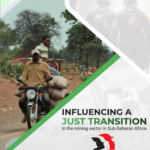8 May, 2024With abundant transition mineral resources in Sub-Saharan Africa (SSA) estimated at 30 per cent, by the International Energy Agency, what are the prospects for these minerals to create millions of the much-needed green jobs?
Experts say that with increasing demand for the critical minerals, there is potential for this demand to spur economic growth and development in SSA. This will be an opportunity for the countries, which are currently facing high levels of poverty, unemployment, and inequality to develop?
The critical minerals include copper, cobalt, lithium, manganese, nickel, platinum group metals, and rare earth elements, and are in high demand for use in the manufacturing of products that are required in the energy transition from electric car vehicles to solar panels and other components.
Researchers Thomas MacNamara and Siziba with support from La Trobe University and the IndustriALL regional office for SSA, went out to find some answers on how unions can influence debates and policy engagement on the Just Transition and on the job creation potential of the transition minerals in the Democratic Republic of the Congo, South Africa, Zambia, and Zimbabwe. The four countries are major producers of the transition minerals with the DRC producing as much as 70 per cent of global cobalt while Zimbabwe has huge resources of lithium.
The researchers of the baseline report entitled Influencing a Just Transition in the mining sector in Sub-Saharan Africa say the green jobs must be assessed on quality, sustainability and appropriateness.
They argue further that, “Almost all sustainability advocates argue that the transition away from fossil fuels will generate more employment than unemployment. However, investigating their claims more thoroughly encourages that the jobs are quality (well-paid, unionized, and safe), sustainable (long-term employment) and appropriate (in areas where mining jobs are being lost and/or requiring similar qualifications).”
The researchers estimate that most of the jobs will be in the construction phase for instance during the installation of solar panels. They cite a Price Waterhouse Cooper (2021) study, in South Africa, which estimated that while 800 000 jobs were created in the construction phase only 21 000 jobs were retained in the operation and maintenance phase. In Zimbabwe, about 7,000 jobs will be created on lithium mines but more jobs can be created through beneficiation of lithium instead of exporting raw lithium to China.
In the informal mining economy in the DRC, Zambia, and Zimbabwe, especially in artisanal and small-scale mining(ASM) millions of jobs can be created. In the DRC alone, the ASM economy has over two million workers but without formalization ASM activities fall short of the decent work agenda.
The research report, which analyses the diverse definitions of what is meant by a Just Transition, and the complexities of COP processes, gives examples of different models and best practices of the Just Transition in Australia, Brazil, Canada, Germany, Canada, India and Indonesia, Italy and other countries from which lessons can be drawn for Sub- Saharan Africa.
Glen Mpufane, IndustriALL director for mining said:
“This research report shows that trade unions should be cautiously optimistic about green jobs and continue to demand decent working conditions in the critical minerals sector. Mineworkers’ unions have consistently fought for better working conditions and living wages and should maintain their vigilance in defending workers’ rights and interests.”
Influencing a Just Transition in the mining sector in Sub-Saharan Africa is published on this link and complements other IndustriALL publications that include A Trade Union Guide of Practice for a Just Transition.


